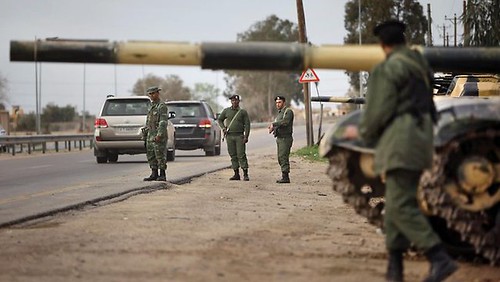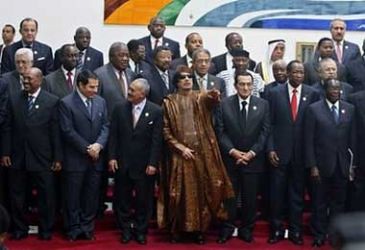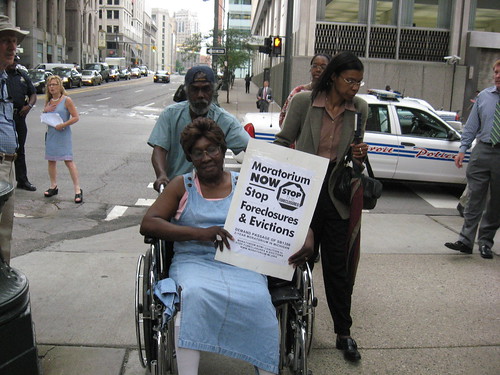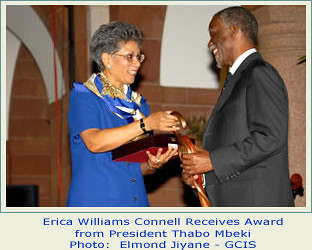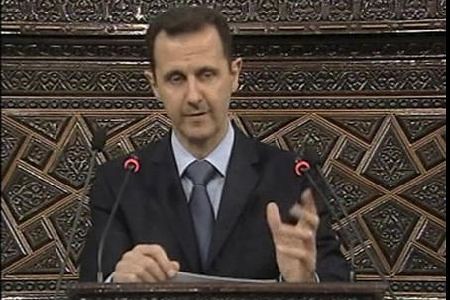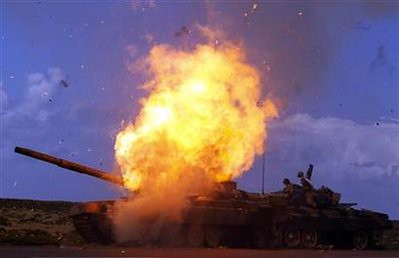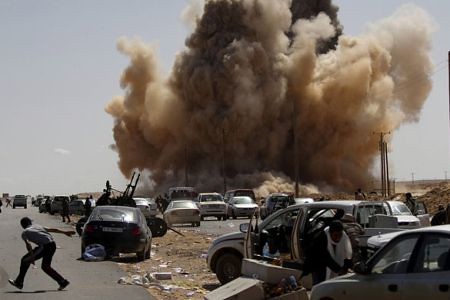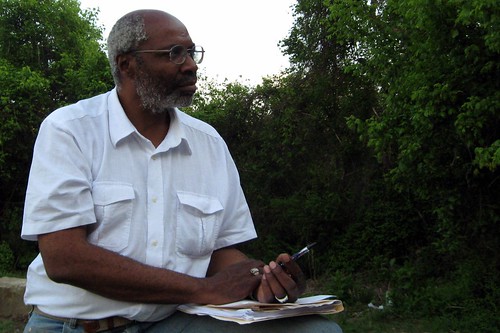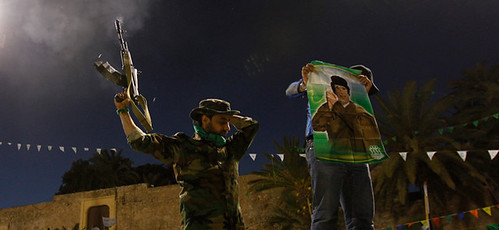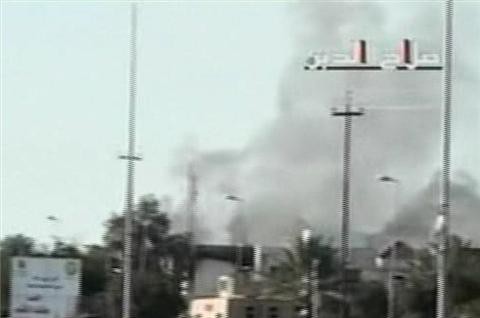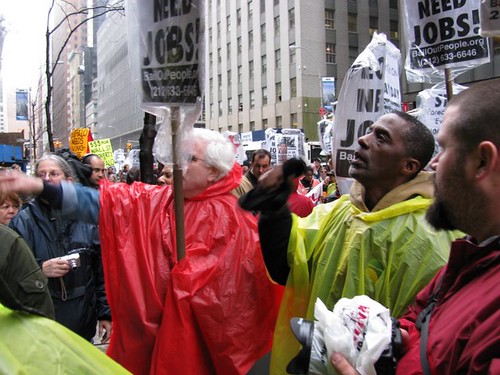
Abayomi Azikiwe, Pan-African News Wire editor, covers a home defense on the city's west side. A campaign is unfolding to win a moratorium on all foreclosures and evictions in Michigan. (Photo: Alan Pollock)., a photo by Pan-African News Wire File Photos on Flickr.
Africa, the CIA and the War Against Libya
From Berlin to London: the imperialist agenda continues unabated
By Abayomi Azikiwe
Editor, Pan-African News Wire
Since the beginning of the western aerial and missile campaigns against Libya under the leadership of the United States on March 19, over 1,000 bombing missions have been carried out against this North African state. Although the Obama administration and the other European governments that have targeted Libya for destruction and regime-change say that they are bombing the country to protect civilians, anyone who has any knowledge of the history of the U.S. and other western imperialist states know that this never has been a motivating factor in any previous intervention on the continent of Africa.
On March 28 U.S. President Barack Obama spoke on network television from the National Defense College on why it was necessary for the government to enter another war, this time on the African continent. Obama said that the military operation against Libya was “limited” and was part of an “international effort” to protect civilians.
Nonetheless, the entire approach to the internal rebellion in Libya on the part of the U.S. and other western governments has never been concerned about the protection of civilians and only designed to launch a major war in Africa aimed at seizing the oil and natural gas resources of Libya and the establishment of another base for imperialist military intrigue and domination throughout the entire region. The U.S. is already involved in wars in Afghanistan, Pakistan, Iraq, Somalia and Colombia, in addition to supporting the Israeli occupation of Palestine.
Obama said during his address to U.S. military officers and cadets on March 28 that “For generations, the United States of America has played a unique role as an anchor of global security and advocate for human freedom.” However, many within the African continent have not accepted this premise advanced by Obama as evidenced by the overwhelming objection to the establishment of military bases for the U.S. Africa Command (AFRCIOM) on the continent.
Even though the U.S. does have a military base in the Horn of Africa nation of Djibouti, the strategic objectives of Washington requires additional beachheads throughout the continent in order to secure the control and supply of oil, natural resources and the dominance of shipping lanes and trade routes. Africa now supplies more oil to the U.S. than does the entire Arabian Peninsula, therefore, the Pentagon will make efforts to enhance its military presence on the continent to ensure the continued profitability of the petroleum and mining industries and their financial backers on Wall Street.
Even a cursory looks at the actual history of the United States only going back to the conclusion of World War II reveals that the ruling class interests that have controlled successive governments over the last seven decades have contributed more to global insecurity than any other industrialized state in the world.
The U.S. Since World War II
Since the conclusion of World War II the United States has fully emerged as the most aggressive imperialist power internationally. This is evidenced even more so today with the collapse of the Soviet Union and Eastern European Comecon countries two decades ago. However, rivalries with other emerging and developing countries and geo-political regions still compel U.S. foreign policy toward economic and political domination.
On the African continent, the People’s Republic of China has developed strong economic relations with numerous states throughout the continent. African governments of various political persuasions have looked to China as an alternative for trade and development.
This seeking of an alternative to the former colonial countries of Europe and the U.S. has forced the capitalist class inside these western states to accelerate their militaristic posture towards Africa, the Middle East, Central Asia and Latin America. The current U.S.-led campaign against Libya follows a succession of wars against peoples of the developing world in the modern period.
In 1950 the U.S. launched an invasion of the Korean Peninsula to prevent the unification of the country under the leadership of the Worker’s Party which had consolidated power in the North after 1948. The Korean War lasted until 1953 and resulted in the deaths of four million people from that Asian nation.
Later in Vietnam, the U.S. maintained a war of occupation between 1961 and 1975. The war involved the dispatching of millions of U.S. troops, of which some 58,000 were killed and many others wounded and damaged for life. The economic and political impact of the Vietnam War during the 1960s and 1970s permanently shifted the character of the social structures within the U.S. It was during this period that the major restructuring of industry and commerce would create dire conditions for residents of large urban areas as well as small town and farm communities.
In Africa, successive U.S. administrations since 1945 have supported the imperialist states of Europe when they sought to prevent the genuine national liberation of their colonies. Although in some countries, various presidents paid lip service to self-determination and independence for colonies, the nature of U.S. policy was to maintain these former colonies within the sphere imperialist domination and influence.
During the early period of Congo independence from Belgium in 1960, the United States intervened in support of the European colonial power and to enhance its own interests inside this mineral rich African country. The intervention of the United Nations led to the coup against Prime Minister Patrice Lumumba, his kidnapping with the assistance of the C.I.A. and his eventual torture and execution under the supervision of the imperialist powers.
This same pattern held during the liberation struggles in the former Portuguese colonies of Mozambique, Angola, Guinea-Bissau, Cape Verde, Sao Tome and Principe, where the fascist Salazar and Caetano governments in one of Europe’s poorest states were financed and armed by the North Atlantic Treaty Organization (NATO), under whose titular supervision Libya is being bombed today. In South Africa and Namibia, the U.S.-based multi-national corporations benefited from the apartheid system of settler-colonialism for many years.
Also in 1966, the U.S. engineered a reactionary police and military coup against the Ghana government under the leadership of the Convention People’s Party headed by Dr. Kwame Nkrumah. Nkrumah, who led the national liberation movements during the post World War II period in Africa, drew the ire of the U.S. when he sought to create a socialist state and expose the role of Washington as the dominant focus in the struggle against neo-colonialism, which he described as the last stage of imperialism.
In Angola during the post-independence period between 1975-1989, the U.S. would support a counter-revolutionary military organization, UNITA, which sought to reverse the course of the revolution in that Southern African country and to halt the inevitable liberation in Namibia and South Africa, which took place in 1990 and 1994 respectively. As it relates to the struggle against apartheid in South Africa, the U.S. was openly on the side of the white settlers who instituted a system of modern slavery where Africans were exploited and oppressed as a result of governmental policy.
All throughout Latin America and Africa, the U.S. has sought to prevent any semblance of real political and economic independence. A former C.I.A. officer described U.S. policy on the continent as a continuation of colonialism and imperialism.
According to Philip Agee, a former C.I.A. officer who resigned and wrote extensively to expose the role of the U.S. in undermining various countries throughout the world, “as in the rest of the world, U.S. policy viewed Africa as a continent where radical and communist influence should be eradicated—a goal that required military support to colonial powers or efforts that would deny real independence to African countries by imposing and sustaining client regimes. Israeli government agencies and private companies, in addition to Americans and Europeans, also established operations, including technical assistance and military training in African countries.” (Dirty Work, The CIA in Africa, 1979, p. 2)
Agee points out in contrast that “For the Africans, however, the problem was to overcome the legacy of colonialism: poverty, illiteracy, disease, and the ethnic, religious, and tribal divisions that crossed the arbitrarily drawn colonial borders. And despite their many differences, African leaders were united, in words and often in action, in opposition to continuing colonialism, neo-colonialism, and white-minority rule.”
The Legacy of the Berlin Conference
In 1884-1885 various European countries met in Germany to hammer out the future of imperial conquest in Africa. For over four centuries, Africa had been ravaged by the Atlantic Slave Trade where millions of its people were taken bondage on the continent and transported to Western Europe and the Western Hemisphere as human chattel.
It was the impact of the enslavement of African people that set the stage for the eventual colonization of the continent. The United States became a substantial economic power as a result of the system of slavery that dominated the country between its formation as a state in the late 18th Century until the eve of the Civil War in 1860. Contradictions within the economic system of slavery would arise strongly during the 1850s, when the burgeoning industries in the Northern states began to pressure the Southern planters to concede more authority within the U.S. Congress along with trading and financial markets.
Even after the Civil War and the failure of Black Reconstruction, the African people were placed under a system that was equally exploitative and oppressive as chattel slavery. Thousands of Africans were lynched under the prevailing political culture of the South and other parts of the country during the late 19th and first half of the 20th Century.
After the Civil War, the South would be doomed to playing a second class role within the economic growth of the United States. It would not be until the latter decades of the 20th Century that industrial and service production shifted back to the southern United States.
In the 1880s, European states were scrambling for the control of various regions of the African continent. The convening of the Berlin Conference signaled the emergence of Germany as an imperial power under the first chancellor, Otto von Bismarck. The outcome of the gathering was the General Act of the Berlin Conference that formalized the carving up of the continent for the benefit of Europe.
The United States had established a colony in West Africa in 1821, when the outpost of Liberia was formed under the leadership of President James Monroe of Virginia. The settlement of Liberia was established by Southerners as a means of re-locating former African slaves.
This process of re-location grew out of the American Colonization Society that was set up in 1816 and enjoyed support from those Africans who felt that it was impossible for them to live in the U.S. as free people. The establishment of Liberia in the early years of the 19th Century coincided with the so-called Monroe Doctrine which demanded that Europeans refrain from interference in Latin America in exchange for the U.S. not becoming involved in conflicts taking place in Europe.
The London Conference on Libya that was held in late March 2011, represented the continuation of the process that began in Berlin in 1884. According to news accounts of the gathering, the so-called rebel forces fighting against the Libyan government were not invited to participate in the gathering that was largely confined to the U.S. and the Western European imperialist states and their allies in the Middle East.
This conference in London was designed to chart the efforts aimed at regime-change and occupation in Libya. The conveners of the London meeting could not be concerned about protecting civilians or creating a peaceful atmosphere since they categorically rejected all efforts by the Latin American and African states to implement negotiations and a plan to reduce tension in Libya.
Although the African Union’s Peace and Security Council had met on March 10-11 and issued a communiqué opposing foreign intervention in Libya and calling for a ceasefire and immediate negotiations, the imperialists and their allies had a totally different agenda and that is war and conquest. The Obama administration demands that the Libyan government be overthrown, yet coddles the oppressive regimes in Yemen and Bahrain that are slaughtering the people within the democratic movement on a daily basis.
Consequently, the Obama administration’s claim that it is concerned about protecting civilians rings hollow in light of developments in Yemen and Bahrain as well as other states within the region that are supported by Washington. The bombing of Libya can in no way bring peace and security to that North African country. The purpose of these military actions is to seize control of this country and its natural resources. Conditions in Iraq and Afghanistan should be evidence enough of the perils of U.S. military intervention in developing states.
The Role of the C.I.A. in Libya Today
A New York Times article reported on March 30 that the United States had Central Intelligence Agency operatives in Libya assisting the counter-revolutionary rebels and indentifying targets to be bombed by fighter aircraft and tomahawk missiles stationed off the coast of the country in the Mediterranean. Judging from the history of U.S. and European involvement in Africa, it would be surprising if Washington was not behind the efforts to engineer regime-change in the continent’s most prosperous state which has the largest known oil reserves in Africa.
The New York Times article states that “small groups of C.I.A. operatives have been working in Libya for several weeks as part of a shadow force of Westerners that the Obama administration hopes can help bleed Colonel Qaddafi’s military….” This same report notes that “In addition to the C.I.A. presence, composed of an unknown number of Americans who had worked at the spy agency’s station in Tripoli and others who arrived more recently, current and former British officials said that dozens of British special forces and MI6 intelligence officers are working inside Libya.”
This same article reveals that “The British operatives have been directing airstrikes from British jets and gathering intelligence about the whereabouts of Libyan government tank columns, artillery pieces and missile installations, officials said…. Several weeks ago, President Obama signed a secret finding authorizing the C.I.A. to provide arms and other support to Libyan rebels.”
Therefore, the current president of the United States and prime minister of Britain are utilizing their intelligence services and special forces to coordinate the destabilization, bombing and attempted overthrow of a sovereign African state. These actions are following the same pattern of the imperialist interventions against national liberation movements and progressive governments in Africa that the U.S. and other western states perceive as threats or “targets of opportunity” for their military forces.
Obama can only make an argument that U.S. ruling class interests are threatened in Libya if he begins with the assumption that the existence of governments and political movements that operate outside the control of Washington warrant the military attention of the Pentagon. In fact the current U.S. interference in the internal affairs of Libya did not begin on Feb. 17, but extends back decades with the presence of a army base in the country which was closed after the revolution of 1969 that was led by the Revolutionary Command Council under Gaddafi.
The National Salvation Front and other groups have been trained, financed and given political support by the U.S. for decades. Today it is the counter-revolutionary rebels who are being given military cover by the stealth bombers and tomahawk missiles that are bombarding the North African state on a daily basis.
Obama represents U.S. ruling class interests in Africa and throughout the world. Since the beginning of the current administration, the war in Afghanistan has escalated and spread rapidly into Pakistan. In Somalia, the U.S. is carrying out a proxy war where it is financing the presence of the African Union Mission to Somalia (AMISOM) that is staffed by the pro-U.S. regimes of Uganda and Burundi.
The imposition of economic sanctions, the seizure of Libyan assets abroad, the naval blockade of the country under the guise of an arms embargo and the massive bombing and disinformation program against the North African state, is only designed to reinforce imperialist control of the land, waterways and resources of Africa and the Middle East. African people, governments and all those of goodwill around the world must oppose the war against Libya and demand an immediate ceasefire and the withdrawal of imperialist forces from the region.
